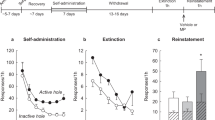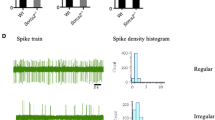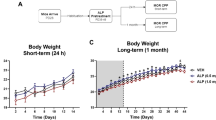Abstract
Evidence in laboratory animals indicates that exposure to stimulants produces sensitization to their rewarding effects1, a process that in humans would be expected to increase the risk of substance abuse. However, therapeutic administration of stimulants such as methylphenidate (MPH) in children with attention deficit hyperactivity disorder reportedly reduces the risk of substance abuse2. Here we show in rats that exposure to MPH during pre-adolescence causes behavioral and neurobiological adaptations that endure into adulthood, and that are consistent with increased sensitivity to the aversive effects of cocaine.
This is a preview of subscription content, access via your institution
Access options
Subscribe to this journal
Receive 12 print issues and online access
$209.00 per year
only $17.42 per issue
Buy this article
- Purchase on Springer Link
- Instant access to full article PDF
Prices may be subject to local taxes which are calculated during checkout



Similar content being viewed by others
References
Robinson, T. E. & Berridge, K. C. Addiction 95, S91–S117 (2000).
Biederman, J., Wilens, T., Mick, E., Spencer, T. & Faraone, S. V. Pediatrics 104, e20, 1–5 (1999).
Wargin, W. et al. J. Pharmacol. Exp. Ther. 226, 382–386 (1983).
Andersen, S. L. Behav. Brain Res. (in press).
Carlezon, W. A. Jr. et al. Science 282, 2272–2275 (1998).
Kelz, M. B. et al. Nature 401, 272–276 (1999).
Wise, R. A. & Bozarth, M. A. Psych. Rev. 94, 469–492 (1987).
Nestler, E. J. Nat. Rev. Neurosci. 2, 119–128 (2001).
Cole, R. L., Konradi, C., Douglass, J. & Hyman, S. E. Neuron 14, 813–823 (1995).
Di Chiara, G. & Imperato, A. Proc. Natl. Acad. Sci. USA 85, 5274–5278 (1989).
Bals-Kubik, R., Herz, A. & Shippenberg, T. S. Psychopharmacology 98, 203–206 (1993).
Rosengarten, H. & Friedhoff, A. J. Science 203, 1133–1135 (1979).
Brandon, C. L., Marinelli, M., Baker, L. K. & White, F. J. Neuropsychopharmacology 25, 651–661 (2001).
Shaywitz, A. J. & Greenberg, M. E. Annu. Rev. Biochem. 68, 821–861 (1999).
Pliakas, A. M. et al. J. Neurosci. 21, 7397–7403 (2001).
Acknowledgements
Supported by the Tourette's Syndrome Association (S.L.A.), the Canadian Institutes for Health Research (A.A.), the Whitehall Foundation (W.A.C.) and the National Institute on Drug Abuse (DA12736, W.A.C.).
Author information
Authors and Affiliations
Corresponding author
Supplementary information
Rights and permissions
About this article
Cite this article
Andersen, S., Arvanitogiannis, A., Pliakas, A. et al. Altered responsiveness to cocaine in rats exposed to methylphenidate during development. Nat Neurosci 5, 13–14 (2002). https://doi.org/10.1038/nn777
Received:
Accepted:
Published:
Issue Date:
DOI: https://doi.org/10.1038/nn777
This article is cited by
-
Age differences to methylphenidate-NAc neuronal and behavioral recordings from freely behaving animals
Journal of Neural Transmission (2022)
-
Evidence That Methylphenidate Treatment Evokes Anxiety-Like Behavior Through Glucose Hypometabolism and Disruption of the Orbitofrontal Cortex Metabolic Networks
Neurotoxicity Research (2021)
-
Juvenile exposure to methylphenidate and guanfacine in rats: effects on early delay discounting and later cocaine-taking behavior
Psychopharmacology (2019)
-
ADHD pathogenesis in the immune, endocrine and nervous systems of juvenile and maturating SHR and WKY rats
Psychopharmacology (2019)
-
Long-term effects of stimulant exposure on cerebral blood flow response to methylphenidate and behavior in attention-deficit hyperactivity disorder
Brain Imaging and Behavior (2018)



